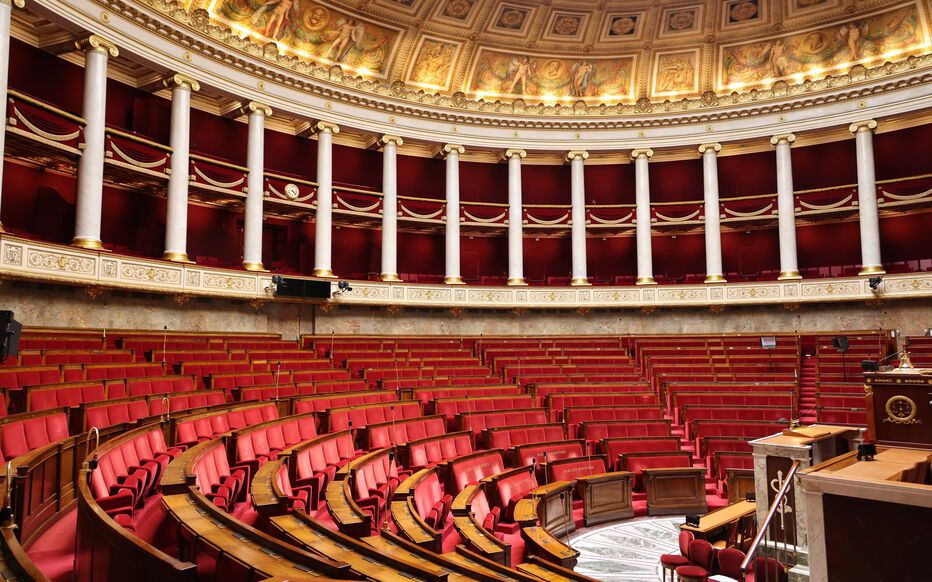Last Thursday, the newly elected French MPs had to conduct their first mission in the glorious Palais Bourbon: vote for the prestigious role of Head of National Assembly. This is the fourth most important state role in France as it is responsible for ensuring the guiding principle of debates and that the Assembly rulebook is correctly respected by all political camps. It therefore does not come as a surprise that every party wants to grab this position as it can prove to give an advantage during debates.

Source: La Chaine Parlementaire (LCP), 2024
The alliance formed by the left (Nouveau Front Populaire) was in pole position for this vote, as they are currently the dominant force in the Assembly with 193 seats. However, it was Yaël Braun-Pivet that took the throne in the third round of elections thanks to a collaboration between Macron’s centrist party (Ensemble), conservatives (Droite Républicaine), and a few votes from alternative candidates previously defeated, which allowed her to jump from 124 votes in the first round to 220 in the third (Assemblée Nationale, 2024).
Reactions from different parties to this re-election did not take long to come, with both far right and far left expressing disappointment and concerns over such nomination.
Mathilde Panot, president of leftwing group La France Insoumise (LFI) said that the result was “stolen” from the left due to “shenanigans” (Franceinfo, 2024) set up by Macron. She indeed believes that the role of Head of Assembly belongs to the leftwing as they came first in the newly formed assembly, and most notably their candidate André Chassaigne (president of the Communist party), who came close to being elected, by totalling 200 votes in the first round of election. However, he failed to convince any more MPs to vote for him in the next rounds making him lose out in the third round with 13 less votes than Yaël Braun-Pivet.
The far-right was also quick to react to the failure of their candidate Sébastien Chenu who denounces a lack of transparence from the Droite Républicaine who presented themselves as “against macronie (the Macron movement)” (Franceinfo, 2024) to their electors, but ended up “serving him” in this vote.
It is important to note that this alliance (during votes) between Droite Républicaine (DR) and Macron is not new, and certainly not surprising. It was actually already the case in the past two years before Macron’s surprise snap parliamentary elections called in June. However, this time DR has a card to play, as Macron desperately needs their vote if he wants to have any chance to pass a law at parliament for the next year (date until he will be able to conduct another snap election). The Droite Républicaine agreed to vote for Yaël Braun-Pivet and remove their candidate (François Juvin) after the first round of election, if Macron’s camp then voted for some of their candidates for other roles such as the secretary of state for the commission of economic affairs (Vincent Rolland) or the secretary of state for the commission of the defense (Valérie Bazin-Malgras). On top of that, the president of the conservative group Laurent Wauquiez confirmed to Le Figaro newspaper that his group was working on a “legislative pact” (Conruyt & Galiero, 2024) that will be proposed to Macron’s camp which would include measures to cut immigration and increase take-home pay, however he also confirmed he did not want to enter a coalition with Macron.
This first vote by French MPs is particularly important and takes place in a complicated and unique context where no parliamentary group has an absolute majority of the 577 seats in the Assembly. Many believe the post of Head of Assembly can be considered a steppingstone for one parliamentary group in the quest of forming a functioning government.
The focus in French politics will now shift towards one central question: Who will be Prime Minister?
By coming first in parliamentary elections, the NFP (LFI, Socialists, Communists, Greens, and others) should have been in the best position to get this role. However, due to internal disagreements about who should get the role, they are yet to propose a candidate backed by the entire left alliance.
Macron also does not seem too adamant with the nomination of a left-wing government, and advocates for a governing alliance that would stretch from center-left to conservative right, excluding both far right (Rassemblement National) and far left (LFI) from any important governing roles. This was also particularly pushed by a former Minister of Europe under Macron, Clément Beaune, who expressed his desire on X for a coalition between Greens, Socialists, Communists, Centrists, and the moderate right, calling it the “Union of the responsible” (Beaune, 2024).
Uncertainty is definitely the main word to describe the state of French politics at the moment, tension is rising, and it seems no Prime Minister could create a consensus between every political camp. With the Paris Olympic games fast approaching, we can only hope tension eases down and that the National Assembly comes back to a place of democracy where every political camp makes concessions in the best interest of the French population.






